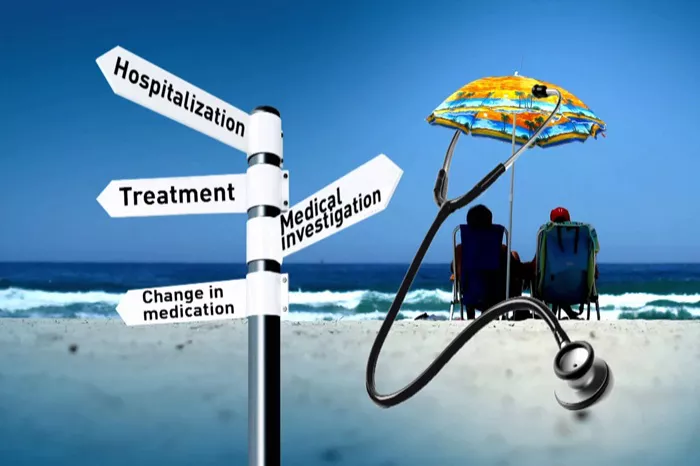Traveling, whether for leisure or business, brings excitement and the thrill of new experiences. However, it also brings the risk of unforeseen events, especially health-related emergencies. This is where medical travel insurance comes into play, offering a safety net that ensures travelers can focus on enjoying their trip rather than worrying about potential medical expenses. In this article, we will delve into how medical travel insurance works, its benefits, the types of coverage available, and what to look for when choosing a policy.
What is Medical Travel Insurance?
Medical travel insurance is a type of insurance policy that provides coverage for medical expenses incurred while traveling. It is designed to cover a range of health-related issues, from minor ailments to major medical emergencies, that may occur during a trip. This type of insurance can be purchased as a standalone policy or as part of a broader travel insurance package.
Why is Medical Travel Insurance Important?
Medical travel insurance is crucial for several reasons:
Travelers may not have access to their regular healthcare providers and facilities when abroad. Medical travel insurance ensures they can receive appropriate medical care without worrying about the costs.
Healthcare systems vary significantly from one country to another. In some places, medical treatment can be extremely expensive. Medical travel insurance helps mitigate these costs, preventing financial strain.
In case of severe medical emergencies, such as accidents or serious illnesses, medical travel insurance can cover the costs of evacuation or repatriation, ensuring the traveler receives the necessary care either locally or back home.
Types of Coverage in Medical Travel Insurance
Medical travel insurance policies can vary widely in terms of coverage. However, most policies typically include the following components:
Emergency Medical Expenses
This is the core component of medical travel insurance. It covers the cost of medical treatment in the event of an illness or injury while traveling. This can include doctor visits, hospital stays, surgery, prescription medications, and other related expenses.
Emergency Evacuation and Repatriation
If a traveler experiences a severe medical emergency that requires specialized treatment not available locally, emergency evacuation coverage can cover the costs of transporting the traveler to the nearest suitable medical facility. Repatriation coverage ensures that, if necessary, the traveler can be transported back to their home country for further treatment or recovery.
Trip Interruption and Cancellation
While primarily related to general travel insurance, this coverage can be critical in medical travel insurance as well. If a medical emergency forces a traveler to cancel or cut short their trip, this coverage can reimburse the non-refundable expenses such as flight tickets, hotel bookings, and tour packages.
Coverage for Pre-existing Conditions
Some medical travel insurance policies offer coverage for pre-existing medical conditions. This means that if a traveler has a known health issue that requires treatment during the trip, it can be covered by the insurance policy. However, this coverage often comes with specific conditions and may require an additional premium.
Accidental Death and Dismemberment
In the unfortunate event of accidental death or severe injury leading to dismemberment while traveling, this coverage provides a lump-sum payment to the policyholder or their beneficiaries.
Dental Coverage
Some medical travel insurance policies include coverage for dental emergencies, such as accidental injury to teeth or severe dental pain that requires immediate attention.
24/7 Assistance Services
Most medical travel insurance providers offer 24/7 assistance services to their policyholders. This can include emergency medical advice, coordination of care, and assistance with finding local medical facilities.
How to Choose the Right Medical Travel Insurance Policy
Choosing the right medical travel insurance policy requires careful consideration of several factors:
Destination
The destination of your travel can significantly impact the type of coverage you need. For instance, if you are traveling to a country with high medical costs, you may want a policy with higher coverage limits. Additionally, some destinations may have specific health risks that should be covered by your policy.
Duration of Travel
The length of your trip can also affect your insurance needs. Short trips may require less extensive coverage, while long-term travel or multiple trips in a year may benefit from an annual multi-trip policy.
Health Status
Your current health status and medical history are critical factors in choosing a policy. If you have pre-existing conditions, look for policies that offer coverage for these conditions. Additionally, consider the level of coverage you might need based on your health.
Activities Planned
If your travel plans include high-risk activities such as skiing, scuba diving, or mountain climbing, ensure that your medical travel insurance policy covers these activities. Standard policies may not include coverage for such activities, requiring additional coverage.
Coverage Limits
Examine the coverage limits of the policy to ensure they are sufficient for your needs. This includes limits on emergency medical expenses, evacuation and repatriation costs, and other related expenses.
Exclusions and Limitations
Carefully read the policy’s exclusions and limitations to understand what is not covered. This can include specific medical conditions, activities, or situations that the insurance will not cover.
Customer Reviews and Reputation
Research the reputation of the insurance provider and read customer reviews. This can give you an idea of the provider’s reliability, customer service, and claims process efficiency.
See Also: Should I Buy Travelers Insurance?
Common Exclusions in Medical Travel Insurance
While medical travel insurance offers extensive coverage, there are common exclusions that travelers should be aware of:
Pre-existing Conditions
Unless specifically covered, pre-existing medical conditions are often excluded from standard medical travel insurance policies.
High-risk Activities
Activities deemed high-risk, such as extreme sports or adventure activities, may not be covered unless additional coverage is purchased.
Substance Abuse
Medical issues arising from substance abuse, including alcohol and drugs, are typically excluded from coverage.
Non-emergency Treatments
Routine medical check-ups, elective procedures, and non-emergency treatments are usually not covered by medical travel insurance.
Travel Against Medical Advice
If a traveler chooses to travel against medical advice, any medical issues that arise may not be covered by the insurance policy.
How to File a Claim
Filing a claim for medical travel insurance involves several steps:
Contact the Insurance Provider
As soon as a medical issue arises, contact your insurance provider. Most providers have a 24/7 helpline for emergencies.
Gather Documentation
Collect all relevant documentation, including medical reports, receipts, and invoices related to your treatment.
Submit the Claim
Complete the claim form provided by your insurance company and submit it along with the required documentation.
Follow Up
Keep in touch with your insurance provider to check the status of your claim and provide any additional information if requested.
The Benefits of Medical Travel Insurance
Peace of Mind
Knowing that you are covered in case of a medical emergency allows you to travel with peace of mind, without worrying about potential medical expenses.
Financial Protection
Medical travel insurance protects you from the high costs of medical treatment abroad, which can be financially devastating.
Access to Quality Care
Insurance providers often have networks of reputable medical facilities and professionals, ensuring you receive quality care when needed.
Assistance Services
The 24/7 assistance services provided by most insurers can be invaluable in an emergency, helping you navigate the local healthcare system and find appropriate care.
Conclusion
Medical travel insurance is an essential aspect of travel planning that provides crucial protection and peace of mind. By understanding how medical travel insurance works, what types of coverage are available, and how to choose the right policy, travelers can ensure they are well-prepared for any medical emergencies that may arise during their trip. Whether traveling for leisure or business, having comprehensive medical travel insurance can make a significant difference in the overall travel experience.






















